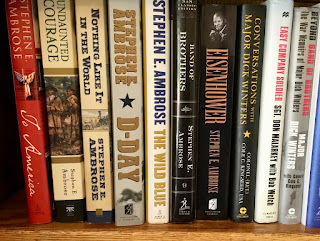I needed to bring some order to the corner I call an office; my bookcases were a mess with no logical order to book arrangement. It was good to handle each book again, because whenever I do the ideas start flowing. So it was when I came to one written by Stephen Ambrose, his Band of Brothers. These “brothers” made up E Company, 506th Regiment, 101 Airborne, a company that fought in World War II from the invasion of Normandy all the way through the war to being the first soldiers to enter Hitler’s Eagle’s Nest.
I’m not sure who hung the name on this company, but whoever it was found it in Act IV, Scene III of Shakespeare's "Henry V.” In it the title character prods his outnumbered British troops against the French at Agincourt in 1415: "We few, we happy few, we band of brothers;/For he today that sheds his blood with me/Shall be my brother ... “
Our community history books inform me one member of this group, Myron Ranney, lived in Sheldon where his father, Russ Ranney, was editor/publisher of The Sheldon Progress. Of course, being born in 1942, I did not know him, but he was a friend and classmate with several people I did know well.
In one of my searches in the archives of The Progress, I copied a short piece that Russ wrote on August 20, 1942 about his son’s joining the army. “A letter came this morning from my son, Myron, saying he has volunteered for the paratroop division of the army. Myron is 19 and a former student of the University of North Dakota. The letter brought a lump to my throat and made it hard for me to go to work. He was not forced to go. But he loves his country greater than his own security.”
Russ Ranney is at rest in the Sheldon cemetery where one restless afternoon I felt a yearning to drive with camera in hand to take some pictures. On his weathered gravemarker was inscribed the dates of his time on earth - February 23, 1892 to September 2, 1947. Obviously he lived long enough to see his son return from the war.
Myron participated successfully and of note in one small action Lt. Dick Winters ordered. Because the company’s parachute jump behind Utah Beach caused them to get widely scattered, Winters could find only thirteen of his men to attack and destroy German artillery pieces that were firing on the beach where American forces were landing. The enveloping maneuver that he ordered is said to be studied yet at West Point as an example of an assault on a fixed position. Without trying to explain the situation, it can be simply said that Ranney and one other man successfully attacked the German’s right flank and helped shut the large guns down. One source quotes Winters as saying that Ranney was one of “Easy Company’s killers who instinctively understood the intricacies of battle.”
So these thoughts are what happened when I reorganized my book collection. The Stephen Ambrose book Band of Brothers will live on, as will the books written by others in the company. Without the wartime experiences they’ve recorded, the stories surrounding residents named Ranney who once lived in my hometown would not have gained my attention to take a second look. Now I must get back to my duties reviewing books for the Western Writers of America. One has been on my desk for a few days.



No comments:
Post a Comment